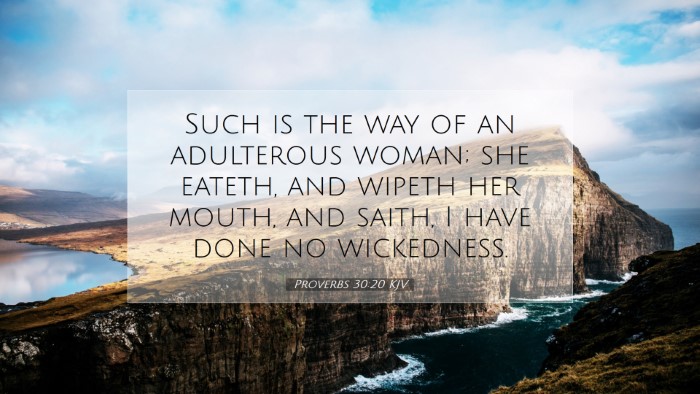Commentary on Proverbs 30:20
Proverbs 30:20 states: "This is the way of an adulterous woman; she eateth, and wipeth her mouth, and saith, I have done no wickedness." This verse presents a vivid illustration of moral depravity and the self-deceptive nature of sin. The commentary from various public domain sources sheds light on its meaning and implications.
Overview
The wise sayings of Proverbs often encapsulate profound truths in short, memorable phrases. In this particular verse, we see a depiction of an adulterous woman, symbolizing unfaithfulness, deceit, and moral compromise. This commentary will explore the nuances of this passage, highlighting the implications for both personal conduct and broader moral teachings.
Insights from Matthew Henry
Matthew Henry comments on the verse by acknowledging the metaphor of the adulterous woman as one who engages in sin and then trivializes her wrongdoing. He notes that this behavior exemplifies a lack of conscience and accountability. According to Henry, the woman's actions—eating and wiping her mouth—suggest a superficial enjoyment of sin without recognizing its gravity.
Henry emphasizes that the phrase, "I have done no wickedness,” reflects a dangerous self-deception. This denial of wrongdoing is especially perilous in today's culture where moral relativism often blurs the lines between right and wrong. The self-justification of sin is a recurring theme in human behavior, and this proverb serves as a cautionary reminder to maintain integrity and accountability.
Reflections by Albert Barnes
Albert Barnes offers a detailed analysis, explaining that the adulterous woman represents those who engage in sin while remaining unrepentant. In his view, the act of eating and wiping the mouth symbolizes indulgence in sin followed by a complete disregard for its consequences. The implication of having 'done no wickedness' reiterates the theme of moral blindness.
Barnes argues that this verse is a warning against the normalization of sin. When individuals become desensitized to their wrongdoing, they fall into a pattern of behavior that continually distances them from God's moral standards. The commentary encourages readers to reflect on their own lives and to be vigilant against complacency regarding sin.
Contributions from Adam Clarke
Adam Clarke interprets this verse within the context of human nature's inclination towards sin. He suggests that the portrayal of the adulterous woman serves as an archetype for those who pursue personal desires without regard to the moral implications of their actions. Clarke highlights the significance of the phrase, "I have done no wickedness,” as it illustrates the dangerous self-rationalization that can often accompany sinful behavior.
Clarke emphasizes that the act of 'wiping her mouth' implies a refusal to acknowledge guilt. This commentary encourages believers to cultivate self-awareness and to approach their actions with humility and caution. By recognizing the possibility of self-deception, individuals can fortify themselves against the temptations that lead to moral failure.
Moral and Theological Implications
This verse does not merely reflect personal conduct but extends to societal norms and values. As believers, it is vital to uphold the standards of integrity outlined in Scripture. The character of the adulterous woman serves as a metaphor for the broader societal temptations that challenge faith and conviction.
- Self-Deception: The primary lesson from this verse warns against the human tendency to deceive oneself concerning moral failings.
- Impacts of Sin: Sin has consequences that extend beyond the individual; it impacts relationships, families, and communities.
- Call to Integrity: The passage serves as a call to maintain purity in thought, word, and deed, remaining accountable to God's standards and to one another.
Conclusion
Proverbs 30:20 encapsulates deep truths about human nature, morality, and the perils of self-justification in sin. As we engage with this verse, we are reminded to remain vigilant in our spiritual lives, to confront our shortcomings, and to pursue righteousness with sincerity. The insights drawn from Matthew Henry, Albert Barnes, and Adam Clarke offer profound wisdom for pastors, students, theologians, and scholars alike, beckoning us to reflect on our actions and their alignment with God's will.


